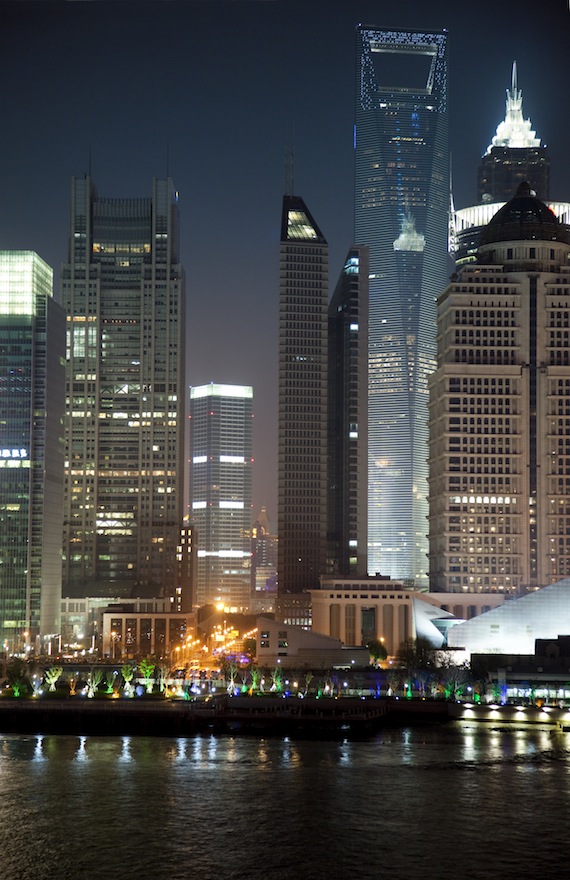When I was 16 years old, I was sitting in the hallways of the local high school, waiting for class to begin, discussing the state of the world with Molly. She stopped me and asked a simple, direct question:
“Do you believe that the life of an American is more valuable than the life of any other human? Because the answer to that question is going to determine your economic, political, social and moral worldview.”

This is modern China. Most Americans don’t understand that it is, in many ways, more advanced than the United States. Image © iStockphoto/Thinkstock
As we established in the first essay on the rise of the Chinese economy, the only way to stop China from becoming a superpower at current population levels is to do everything in our power to ensure that the average Chinese person never earns more than $0.23 for every $1.00 earned by an American. A penny more and they are bigger than we are. There is no getting around that unless we increase our population size.
Ultimately, I answered the question: “No because I believe that all human life, regardless of where a man or woman is born, is equally valuable and should be ranked on criteria such as compassion, intelligence, work ethic, honesty, integrity, charity, and contribution to civilization. For example, a cancer researcher who is finding medical cures for horrible diseases in Belgrade, Serbia is more valuable than a thrice-convicted criminal drug dealer in Cleveland who is up on murder charges. Likewise, if there was a burning bus full of children and I could save two kids from Korea or one kid from America, I’d save the two lives.”
Realizing this did, in fact, help me understand my motivation when looking at the state of the political world. As a result of my unwillingness to forcibly wish 1.3 billion people to live on 23 cents for every dollar we have, we are left with the inevitability of a Chinese superpower to rival the United States.
What are the results? The consequences? The problems?
How Does the United States Deal with a Superpower China?
Honestly, if – and this is a big if – the United States can follow a few, simple guidelines, a superpower China shouldn’t affect our way of life one iota.
- We maintain enough of a military advantage to guarantee mutually assured destruction. Between our weapons and nuclear arms, any other military power needs to understand fully and completely that if they ever attack us, they are pushing the button on their own people.
- We need to run trade balances or surpluses (surpluses probably aren’t likely or we’d alienate our trading partners and start a trade war) so that we were no longer shipping wealth outside of our borders. I talked about this in How to Solve the Trade Deficit.
- We need to ensure the strength of our currency. Although I fully understand the need for the government to print money when necessary (had Bernake not turned on the printing presses to fill the black hole that was the collapsing M2 and M3 money supplies when credit disappeared we would have gone into a deflation that would have made the 1870’s look like a walk in the park), once everything is stabilized and back to normal, I would very much prefer a currency system backed by a balanced budget requirement for Congress.
- We need the best educated and trained work force in the world so that we are the global equivalent of Silicon Valley.
Do I like America being the only superpower in the world? Yeah. Who doesn’t like to be part of one of history’s greatest empires? But notice that the United States itself won’t change. We will still have the same people, natural resources and wealth we always had. However, we will have less relative to a newcomer. Sigmund Freud might call it a case of economic castration anxiety.
The United States Will Still Be a Superpower

China is destined to become an economic and military superpower because once its per capita income reaches the same level of the United States, the difference in population levels will result in it being several magnitudes larger than us. It is purely a function of simple mathematics. Image © Hemera Technologies/Photos.com/Thinkstock
Again, the rise of a superpower won’t make the United States any weaker, it just means we have to share the stage. We have the same planes, weapons, and military might. And there is no doubt that China wants to be an equal superpower both economically and militarily with the United States. That is human nature. It is expected and normal.
In fact, having another superpower on the stage can spur competition. With the money we blew in wars in the past decade we could have likely done something amazing such as start studying how to colonize the moon or the ocean floor. We didn’t enter the space age out of mere curiosity – we wanted to be able to weaponize space before Soviet Russia could. Out of that came non-stick cookware, memory foam beds and a host of other improvements that were applied to everyday living. Competition does funny things to the world.
But will it result in China “telling us what to do”? No more than we have been able to tell the world what to do for the past 65 to 70 years. Was the United States able to tell Russia what to do? Ha! That’s a joke. Can we get Cuba to do what we want? Fat chance! Can we get China to revalue the yuan so they aren’t running such a big trade surplus? Good luck with that. Can they stop us from imposing sanctions on Iran? Nope, we did it anyway. Just like a free will business relationship, all we can do is threaten cause and result, “if you / then we’ll …”
The only time we’ve been able to utilize our international influence in most cases was to recruit some guy for a third-world backwater nation who happened to turn into a worse dictator than the guy we killed for him to replace. After all, we created Saddam Hussein and Osama Bin Laden in Iraq and Afghanistan. If those are the dividends of a superpower, I say screw that investment.
A War Is a Remote Possibility … China Isn’t Russia
[mainbodyad]I think it would take something akin to Hell freezing over for your second choice to happen – a head-to-head confrontation with China – simply because China is now so economically married to the United States that anything that hurts us would cause them severe pain, as well. When Russia rose, in contrast, it did so from the ashes of a beaten down people who thought of capitalism as an ideological enemy. China, although communist in name and still not out of the woods, has basically been having an open affair with capitalism for 20+ years. She still sometimes sides with Iran and Russia but every day, the roots of the two countries grow more intertwined.
Consider that most of the trade surpluses China has earned from the United States are sitting in the Bank of China as American currency, Treasury bills, bonds and notes, and investment assets, such as corporate stocks and bonds. (If you have a product made in China and you pay your vendor in United States dollars, the vendor can’t use that to pay his bills so he is going to take a trip to his local bank to exchange our greenbacks for Chinese yuan. The bank then ships it to the Bank of China, which is how all of it ends up at the nation’s central financial institution.) The rest of the trade surplus is in the hands of wealthy Chinese business owners, investors, and industrialists who maintain investments in the United States.
In fact, I think that as the economic interdependence grows, you’re going to get a “the world is flat” effect where the institutional inertia within corporate China, government China and worker China is “don’t screw with our money”. If America went to war, China would suddenly find half of its factories empty.
I’m not saying it couldn’t happen. I’m just saying that once you have a strong middle class in China that is used to a certain lifestyle, and the existence and strength of America is a requisite part of that lifestyle, they are going to become protective of us just like we are with Canada, Great Britain, Japan, South Korea, India, France, Germany and Italy. The world has never before seen international trade and relationships on this scope. The past 70 years have been unlike anything our ancestors knew or could comprehend.
If someone started bombing Japan, we’d be at their side immediately, fighter jets locked and loaded. That would have been inconceivable to your great grandfather, just as the same relationship with China seems to be for many Americans today. But not only do we like Japan, we can’t afford for anything to happen to them. Their losses are our losses.
Anything Can Happen … the World is an Interesting Place
Of course, anything can happen – just look at the Iranian Revolution. I don’t think it is likely to happen and, again, the only alternative to stop it is to forcibly keep Chinese GDP per capita at sub-poverty levels. There is nothing about that course of action that is moral or good. It is choosing power over humanity. (And we’re not really giving up power – we have the world’s largest nuclear arms capacity.)
As a result, I’m fine if we maintain the four policies as a country that I laid out earlier. Just because another big kid shows up at the playground doesn’t mean anything in our life has to change other than we may have to consider the feelings of the other 96% of the world rather than our own interests.
We Survived 7/8th of Our Nation’s History Without Being the World’s Sole Superpower and We Did Just Fine
I think you overestimate what a “superpower” means or the degree to which the 96%+ of people who live on planet Earth think about us. Most don’t even consider us at all.

While teaching students English as a second language in Austria and Germany, my friend was shocked when the children asked to see his gun. They believed that America must be a crime-ridden nightmare because we all insisted on carrying weapons due to the second amendment. I don’t think Americans truly, fundamentally understand how horrible our global image is. We have a branding problem because to much, if not most, of Earth, we are no longer the land of opportunity where you can be free. We are a nation of bigoted, hateful, ignorant, racist nutcases that want to bomb everything. We are a long way away from John F. Kennedy’s United States. Image from Wikimedia Commons.
To give you an idea, I have a friend who was a Fulbright scholar. Shortly after college, he was shipped to Germany and Austria to teach students how to speak English as part of an honors program. The first thing the children wanted to know? If they could see his gun. “My gun?! What are you talking about!” Turns out, all of the kids thought that our obsession with the second amendment was because crime rates were off the charts and everyone walked down the street carrying an assault weapon, just like in Afghanistan. They believed if you walked down Fifth Avenue, someone might have an uzi on them.
The rest of the world does not see us a moral authority. They see us as a belligerent bully who won’t mind her own business and wants to tell everyone else how to live. I believe America is good. You believe America is good. But that doesn’t mean much because every nation believes they are better than others, even the horrible ones like Nazi Germany and the officers in Spain during the Inquisition.
We can’t be the world’s police. We survived for 170 years being a small nation no one really considered and the past 70 years as a superpower but only 30 years as the lone superpower. In mathematical terms, we have only been the sole superpower for 1/8th our time as a nation and we did just fine for the 7/8ths of our history where we weren’t involving ourselves in every corner of the globe.
Again, it comes down to the inevitable reality that the United States can either actively work to keep 1/5th of the human race in crushing poverty or we can share the stage with another superpower. I think the only moral and ethical choice is the the latter. Don’t you? I have faith that we are resourceful and intelligent enough to protect our own interests.
[mainbodyad]Does that make me “enthusiastic” about the rise of China? Given that virtually all of Africa has been unable to pull itself out of hell hole territory in the past 100+ years, yeah the miraculous growth of South Korea and China excites me. It makes me happy to know that when people dedicate themselves to capitalistic policies, their people finally prosper. It gives me hope for the future of humanity. That renewed faith in the power of people to achieve what they set out to do and escape grinding poverty far outstrips my sense of loss of bragging rights about being the “richest” “biggest” and “most powerful”.



